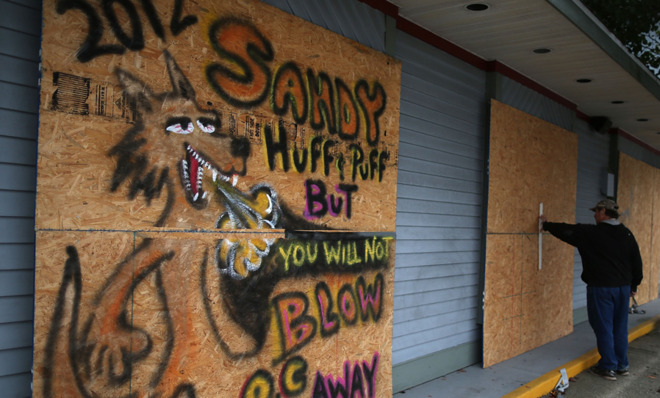The deadly sexism of hurricane naming
There was nothing "weak, warm, and passive" about a hurricane named Sandy

A free daily email with the biggest news stories of the day – and the best features from TheWeek.com
You are now subscribed
Your newsletter sign-up was successful
Giving hurricanes human names makes it easier for the public to keep track of storms, remember safety information, and make historical references. But the names we use, (which are chosen by the World Meteorological Organization), can also cloud our judgment — sometimes to lethal effect.
When researchers from the University of Illinois and Arizona State University looked at the death tolls for all hurricanes that made landfall in the U.S. from 1950 to 2012, they found that storms with feminine names were more deadly than storms with masculine names.
Atlantic hurricanes are named somewhat arbitrarily, with alternating male and female names pulled from pre-determined lists, so there's nothing inherently more destructive about "female" storms. Instead, the researchers think, the problem is the perception that people get from gendered names.
The Week
Escape your echo chamber. Get the facts behind the news, plus analysis from multiple perspectives.

Sign up for The Week's Free Newsletters
From our morning news briefing to a weekly Good News Newsletter, get the best of The Week delivered directly to your inbox.
From our morning news briefing to a weekly Good News Newsletter, get the best of The Week delivered directly to your inbox.
We're often socialized to think of women as the "fairer sex." Men are "expected to be strong, competent, and aggressive, whereas women are often expected to be weak, warm, and passive," the researchers write. If people let these stereotypes creep into the way they think about hurricanes, and assess a storm's threat not just by its severity, but its gender, then they might assume that female storms will be gentler and less severe. "As a result," the researchers say, "a hurricane with a feminine vs. masculine name will lead to less protective action and more fatalities."
To test that idea, the researchers did six follow-up experiments, asking hundreds of people to make predictions about hypothetical storms and how they would react to them. Men and women each thought that storms with female names would be less intense and risky than ones with male names or no name at all, and that they would be less likely to evacuate on their own or follow a voluntarily evacuation order from authorities if the storm had a female name. In some of the experiments, the people surveyed were asked whether they thought men and women had different traits, and the results stayed the same. People who believed there was a difference in men's and women's warmth and aggressiveness and those who didn't said they'd be less likely to evacuate if the approaching storm had a feminine name.
What's happening here, the researchers say, is a "hazardous form of implicit sexism," one with implications for policymakers, weather forecasters, and the public. Gendered names for natural disasters can tap into gender stereotypes, whether we think we hold any or not, and have unintended and potentially dangerous consequences. In which case, the researchers suggest, it's worth considering a new system for hurricane naming that takes gender bias out of the equation. If that's a bridge too far, then we might at least stop and think about whether we're judging a hurricane objectively, or letting its name — and what we'd expect from something named Irene or Sandy — influence our actions.
A free daily email with the biggest news stories of the day – and the best features from TheWeek.com


